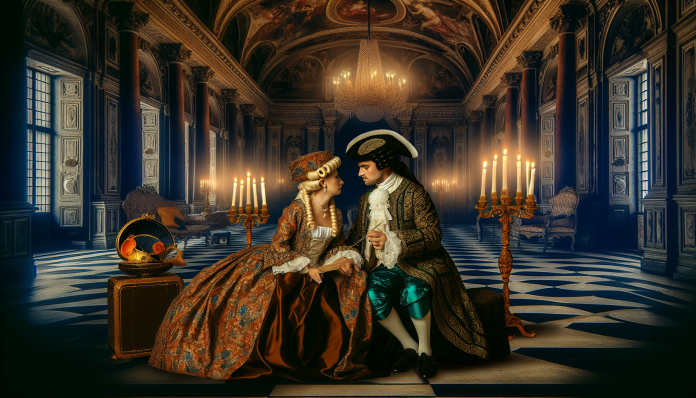Introduction
The tale of King George IV’s enigmatic love life is as extravagant as the man himself. Born as George Augustus Frederick in 1762, he would ascend the throne in 1820 amidst a backdrop of political strife and shifting societal norms. One of the most shocking chapters in his life—a scandal that rocked the British royal family—was his secret marriage to Mrs. Maria Fitzherbert. This affair raises intriguing questions about fidelity, societal expectations, and the intricate nature of relationships during a time when moral standards were rigid and judgmental.
In early 19th-century Britain, societal norms around sex and relationships were heavily influenced by class, religion, and an ever-watchful public eye. Love and fidelity were romantic ideals; however, social status often dictated how intimately one’s behavior was scrutinized. As we explore this scandal, we must consider not only the particulars of their affair but also the profound implications it had on both George IV’s reign and society at large.
The Scandal
The saga begins in 1784 when the then-Prince of Wales first encountered Maria Fitzherbert, a widowed Catholic of modest means. Their connection, forged in the sparkling salons of Georgian high society, blossomed into a passionate—and ultimately secret—love affair. In a time when royal marriages were essentially political transactions, George’s involvement with an unsuitable partner stirred the pot of public opinion and scandal.
Key Events and Public Reaction
-
Secret Marriage: In December 1785, George IV and Maria Fitzherbert defied the norms of their time by secretly marrying in a ceremony conducted by a Catholic priest. This union posed a particular threat to the monarchy’s religious and political foundation, as those within the royal family were expected to marry within the Church of England.
-
Public Revelation: The marriage remained concealed until George officially sought his father’s (King George III) approval to marry the daughter of a prominent nobleman. When the truth about his clandestine union began to surface, it caused an uproar among both the public and the royal court. This revelation led to intense scrutiny of George’s character and choices.
- Public Disapproval: The media at the time, though rudimentary compared to contemporary standards, were still deft at fanning the flames of gossip. Broadsheets and pamphlets circulated stories about the prince’s lascivious lifestyle, while opinion pieces condemned his actions. Observers couldn’t help but view George’s relationship as improper and unmale-like, traits that were lampooned in political cartoons and public discourse alike.
Quotes and Perspectives
Contemporaries of George IV were often critical of his choices. The poet Lord Byron, for one, noted with mockery:
“When kings are in want of love, they would be better to look to their wives, rather than their mistresses.”
Such sentiments encapsulated the public hostility toward the prince’s behavior, reflecting the broader societal desire for adherence to class-based propriety.
Moral and Cultural Analysis
Societal Reaction
The social climate of Georgian England was rife with rigid moral codes. Marriage was less about love and more about social alliances. George IV’s secret marriage flew in the face of these standards. The public’s reaction was informed by a mix of outrage, betrayal, and a sense of moral superiority. The perceived impropriety led to furtive discussions in drawing-room settings and triggered the press to take a sharper stance against the royal family.
Consequences
The repercussions of this scandal were significant:
- Political Tensions: The incident contributed to growing dissatisfaction with the monarchy, further straining George’s relationship with his father and parliament.
- Marital Strain: George reluctantly married Caroline of Brunswick in 1795, a union that was widely deemed a failure and only added to the scandal surrounding his character.
- Social Impact: The scandal also sparked fervor for reform among the emerging middle classes, laying the groundwork for modern views on marriage and personal agency.
Modern Perspectives
Fast forward to the 21st century, where societal norms have dramatically transformed. A revelation like George IV’s secret marriage might not raise as many eyebrows today. With contemporary values advocating for personal freedom, monogamy is no longer the only blueprint for relationships. Many would empathize with the king’s desire for love and partnership outside the bounds of expectation.
Additionally, today’s understanding of media and privacy would allow for a more nuanced discussion about intimate relationships, rather than knee-jerk condemnation. Instead of focusing solely on scandal, the conversation might pivot towards the nature of love and commitment, expanding on notions of partnership that defy conventional molds.
Conclusion
The tumultuous story of King George IV and Maria Fitzherbert provides more than just scandal—it offers a compelling glimpse into the evolution of societal attitudes towards sex, loyalty, and the nuances of personal desire. The challenges faced by the king underscore how power dynamics shape relationships and how the consequences may ripple through generations.
As modern viewers reflect on this intriguing historical narrative, it may inspire an examination of our current moral standings and the flexibility with which we navigate issues of love and intimacy. We might ask ourselves: How have our own blurred lines between love, power, and societal expectations reshaped how we navigate intimacy today?
The story of King George IV reminds us that even royals are not impervious to the complexities of human relationships, offering a timeless lesson on the intersection of love and social morality—one that continues to resonate as society evolves. As we chronicle the sexual habits and scandals of history, let us ponder their enduring relevance and how they sculpt our perspectives on love today.

